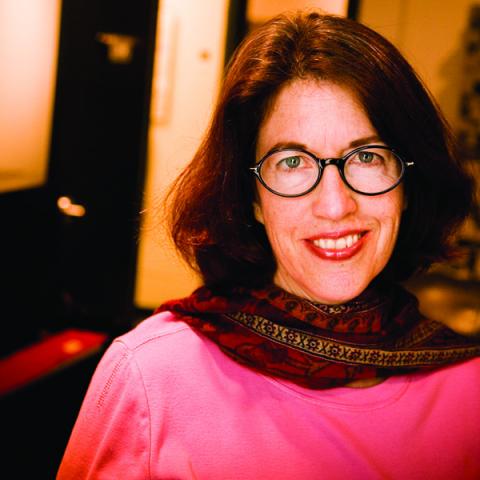Faculty Profile: Susan Rogers

Associate Professor of MP&E Susan Rogers
The California economy was booming, major labels were thriving, and top musicians flocked to the city to record hit albums in the world-class studios that dotted the sun-drenched landscape. It was in that atmosphere in 1978 that a young Susan Rogers felt the pull toward a career as a recording engineer.
She knew that to break into the competitive, male-dominated studio scene, she would have to work harder than her peers. “At the time—and sadly it’s still true today—there’s such a small proportion of women in engineering,” says Rogers, an associate professor in the MP&E Department, she didn’t know any musicians or engineers and had zero experience.
At the time, audio engineering was largely an apprentice-based craft; fortunately, the area’s lone recording school, University of Sound Arts, offered a wealth of opportunity to learn from teachers drawn from the talented local engineering community. Tuition was costly, so an enterprising Rogers took a job at the school as a night receptionist, where she picked up as much information as she could and taught herself electronics on the side. She soon began servicing recording consoles and tape machines around town and eventually landed a staff position at Graham Nash’s Rudy Records studio.
The break of a lifetime came in 1983, when Rogers got word that Prince was looking for a technician. “If someone had said to me in 1983, ‘What’s the job you want more than any other job in the world?’ it would have been to work with Prince,” she says.
Rogers accepted the job offer and left Hollywood for Minneapolis, Prince’s hometown, where the artist was coming off the success of the critically acclaimed 1999 album and tour and beginning work on the project that would catapult him to the top of the pop world. “The next record he did was the Purple Rain album,” she recalls. “It went multiplatium and won an Oscar for Prince. Of course, I had the time of my life.”
After five whirlwind years recording with Prince and his roster of r&b acts, including Sheila E. and the Time, Rogers returned to Los Angeles and established herself as an independent engineer and, ultimately, as a sought-after record producer. Over the next decade, she made records with the likes of David Byrne, Michael Penn, the Violent Femmes, and the Jacksons, to name a few.
For many, producing pop music is a youth-oriented profession. So by the time Rogers reached her mid-forties, she began looking for a vocation that would enable her to make a significant contribution in the next phase of her life. In 2000, after she finished producing the Barenaked Ladies’ multiplatinum Stunt album, Rogers left the studio world behind and enrolled at the University of Minnesota, where she earned her bachelor’s degree in psychology and neuroscience, and then continued her studies at McGill University, where she is currently completing a Ph.D. in music perception and cognition.
For Rogers, the transition from engineering to science was a natural career evolution. “I think that kind of mind—the technical mind that wonders how things work, how things go together—is obviously excited and intrigued by the artistic world,” she says. “Those of us who have engineering or technical minds are interested in the nuts and bolts. So it wasn’t that much of a leap from engineering, which is my passion, to another passion: how does that brain work?”
In her studies at McGill, Rogers explores the science of listening; how humans hear sounds, how they perceive music, how musicians hear differently from nonmusicians, and why musical tastes differ. “How does one person listen to a piece of music and be moved to tears by its beauty, whereas another person listens to that same piece and says, ‘Turn that off’’?” she asks rhetorically. “Natural curiosity made me want to investigate how that works.”
In 2008, Rogers became a member of Berklee’s MP&E Department faculty. And while her main focus is teaching recording technology concepts, science influences everything she teaches in the classroom. She reflects on her years in the L.A. studios thinking how different her interactions might have been if she knew then what she knows now. “If I had had a sensitivity to the differences between people, understood something about psychoacoustics, and how familiarity with music influences our expectations when I was an engineer or a producer, I would have been a better one,” she says.
As a nonmusician who has been surrounded by musicians for most of her life, Rogers feels completely at home in the Berklee community. She finds that musicians as a segment of humanity stand apart. “Musicians are so capable of expressing joy, expressing emotion, because that’s what they do for a living,” she says. “So those emotions are very close to the surface, and that’s wonderful to be around.”
“You can read on every face that they’re not cynical,” she observes. “They’re not jaded; they truly believe that their futures will shake out, whether they ride to the top with recognition and money or stay somewhere in the lower branches. They seem to accept any outcome because they’re making music for a living. And that’s so beautiful to see.”
Sarah Jones is associate director of Women’s Audio Mission, a San Francisco-based nonprofit organization dedicated to the advancement of women in the recording arts.




